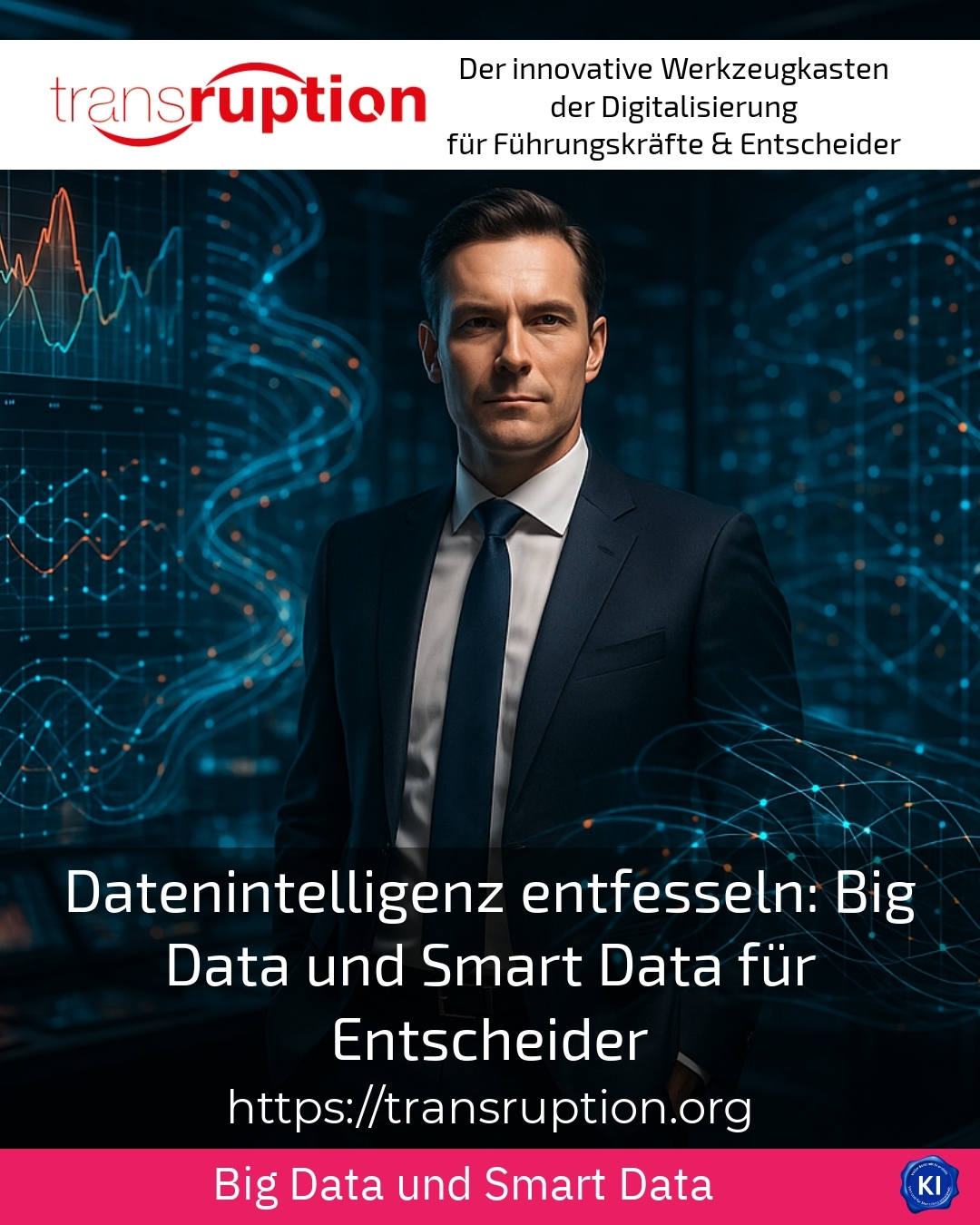In the digital age, handling data is becoming a key challenge for companies. Advancing digitalisation is generating huge amounts of data, known as big data. However, it is only through the targeted analysis and intelligent processing of this data that real value is created. Data intelligence. This supports decision-makers in gaining valuable insights from a flood of information and making forward-looking decisions.
Data intelligence: From a mere mountain of data to valuable knowledge
Big data describes the sheer mass of different data that companies generate every day - from transaction data in retail to machine and sensor data in industry and customer data in the financial sector[3]. However, this raw data alone is rarely directly usable. This is where the concept of data intelligence comes in: Relevant, structured and high-quality information is extracted from the large volume of data, which is referred to as smart data[1][2].
For example, a retail company can analyse millions of customer interactions in order to create precise target group profiles. This results in targeted marketing measures that achieve a higher conversion rate. In industry, smart data is used for predictive maintenance: sensor values are filtered to identify real risks at an early stage and minimise production downtime[3]. In the healthcare sector, doctors are also using data-intelligent analysis of patient records and wearables to develop individualised treatment approaches, which increases the success of treatment and reduces costs.
The importance of quality and context for data intelligence
The difference between big data and smart data can be easily explained by comparing raw materials: Big Data is like crude oil - raw material with no direct use. Smart data, on the other hand, is the refined product, ready for use[1][2]. The decisive factor for data intelligence is not the quantity of data, but its quality, relevance and the context in which it is placed.
Many companies report that big data alone only brings the hoped-for benefits to a limited extent, as the data is often unstructured and incorrect. Smart data is carefully cleansed, filtered and processed with the help of artificial intelligence or machine learning into meaningful information that enables decisions to be made in real time[2][7]. For example, a logistics company can use dynamic route optimisation to shorten delivery times and save costs by only using the data that is really relevant[9].
Personalisation also benefits greatly from data intelligence. Digital marketing campaigns are precisely tailored to individual customer needs, which leads to better customer loyalty and higher sales[6]. Intelligent data processing is therefore a key success factor in almost all industries.
Practical implementation of data intelligence in companies
In order to unleash data intelligence effectively, a well thought-out strategy is required in addition to modern technology. Decision-makers should take care to integrate various data sources sensibly, cleanse them thoroughly and analyse them using algorithms[9]. Data protection also plays a key role in ensuring security and compliance.
A manufacturing company can utilise the following steps in practice: Firstly, it collects sensor data from machines, integrates this with ERP system data and cleans up erroneous messages. Machine learning then helps to discover patterns for error prevention. Management receives visualised reports in order to plan maintenance based on data.
In the financial sector, data intelligence can be used to better assess risks. Banks analyse customer data, market trends and payment flows in order to assess default risks more precisely and optimise lending decisions. This data-driven approach increases transparency and security.
In retail, data intelligence enables the optimisation of stock levels: sales figures, seasonal effects and customer feedback are intelligently evaluated. In this way, reorders and discounts can be controlled in a targeted manner to avoid overstocking and losses.
BEST PRACTICE at the customer (name hidden due to NDA contract) The introduction of data intelligence at a manufacturer led to considerable increases in efficiency. Real-time monitoring of the production facilities significantly reduced downtimes. Maintenance work was planned based on algorithms, which reduced costs and improved production quality. The data-intelligent solution now supports management in decisions relating to resource utilisation and supply chain management.
Tips for integrating data intelligence into your projects
To ensure that projects that utilise data intelligence are successful, you should consider the following impulses:
- Prioritise data quality: Start by cleansing and securing the data so that the analysis is reliable.
- Define core questions: Which decisions should be supported by data intelligence? A clear objective guides the data analysis in a targeted manner.
- Choose technology intelligently: Rely on AI-based analytics tools that enable scalability and automation.
- Involve employees: Encourage dialogue between specialist departments and data experts to strengthen the transfer of knowledge.
- Observe data protection: Integrate compliance rules to adhere to legal requirements and ensure trust.
The transition from big data to smart data is a continuous process. It is worth anchoring data-intelligent approaches in the organisation and work processes step by step.
My analysis
The ability to meaningfully refine data volumes and transform them into meaningful, contextualised information represents an enormous opportunity for companies. Data intelligence is the key to creating real added value from big data. It helps decision-makers to act more efficiently, securely and with foresight. In numerous industries - from production and retail to healthcare - the targeted use of smart data facilitates strategic decisions and operational processes. A consistent data strategy paired with modern technology helps to successfully utilise the potential of modern data worlds.
Further links from the text above:
[1] What is smart data?
[2] Big data vs. smart data: is more always better?
[3] Data intelligence: big data and smart data for decision-makers
[6] Smart data: definition, application and difference to big data
[9] Data intelligence: clever use of big data and smart data
[14] Unleashing data intelligence: Big Data & Smart Data for Decision Makers
For more information and if you have any questions, please contact Contact us or read more blog posts on the topic TRANSRUPTION here.















